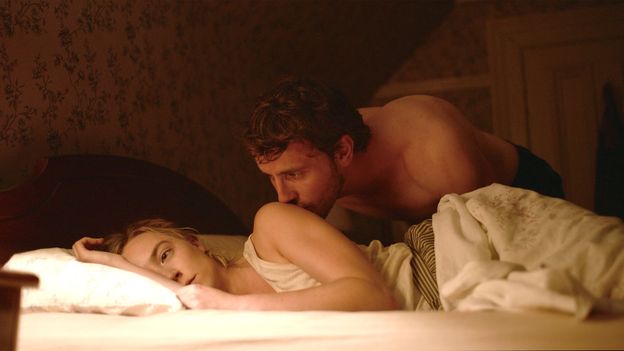
Most futuristic films are so distracted by the neon, Blade Runner-inspired landscapes and high-tech gizmos that they lose sight of any human dimension. The wonder of Foe is that Paul Mescal and Saoirse Ronan, as a rural couple with an intense bond yet a fraying marriage, anchor the film to reality even as it gradually evolves into psychological horror and on to a purely sci-fi ending. Foe plays to the strengths of its actors, two of the most natural and subtle on screen, and is endlessly engaging even though it eventually stumbles into head-spinning narrative problems.
More like this:
– A ‘jaw-droppingly distinctive’ sci-fi
– Emily Blunt is the only reason to watch Pain Hustlers
– Lee could be Winslet’s best role yet
The film is set in 2065, when AIs that look like humans are capable of gaining consciousness and are used as part of the labour force. In this blighted world, water and food are becoming so scarce that experimental space stations have been set up as alternate planets. None of that comes with the usual sci-fi trappings. Instead, Junior (Mescal) and Hen (Ronan) live in a world just as old-timey as their names, in an isolated farmhouse in the Midwest, the dusty, empty land around them stretching for miles.
As the film opens, we see Hen crying in the shower about her unhappiness and her feeling that Junior doesn’t even try to see who she really is. Soon a stranger named Terrance (Aaron Pierre) arrives out of nowhere, his trapezoidal car the rare sign of the future. Full of hot air, he cheerfully tells Junior that he has been “selected” – Terrance’s happy-talk way of saying “Drafted by the government, you don’t have a choice” – to spend years in space. Even then, the film is decidedly Earth-bound. Junior’s trip is a year or so away, and as they wait, he and Hen grapple with the impact of that news.
The director, Garth Davis, has a feel for the texture of a world but never loses sight of the people in it, qualities he brough to Lion (2016) with Dev Patel. Davis also wrote the screenplay with Iain Reid, the author of the 2018 novel it is based on, and he navigates the film’s shifts of tone seamlessly.
For most of the story we share Junior’s point of view, but Foe never divides our sympathies between him or Hen. Ronan gives us a sense of the quiet Hen’s tortured emotions even as she remains enigmatic. Mescal signals Junior’s confusion and anger at Terrance’s edict. He brings as much naturalism to this improbable character of a modest, beer-drinking homebody in an AI-filled world as he did to the role of the father in the perfectly realistic Aftersun.
And the couple’s fundamental conflicts have nothing to do with space. Junior is perfectly complacent in the house his family has owned for generations. Hen is unwilling or unable to say that she might want to see more of the world and Junior is too oblivious to ask her. But her behaviour is becoming erratic. She sends Junior to sleep in the guest room one night, then comes to the guest room to have sex on another morning. An old pop song on the soundtrack is on the nose but also just right, as we hear Skeeter Davis sing, “Don’t you know it’s the end of the world, ‘Cause you don’t love me anymore.” The loss of love and the actual end of the world, with violent dust storms and droughts its harbingers, have rarely been connected so deftly.
Foe
Director: Garth Davis
Cast: Saoirse Ronan, Paul Mescal, Aaron Pierre
Run-time: 1hr 50m
Release date: 6 October
The film’s tone turns more ominous when Terrance announces that while Junior is away his company will leave Hen with a Junior substitute, a lifelike AI to fill in for him. Terrance moves into the house, interrogating and observing Junior, presumably to build the AI authentically. As Junior begins to unravel, Mescal gets to let loose all the anger and the suspicions that have been building.
Terrance is one of the film’s problems, though. Pierce plays him as so coolly detached at the start that he seems like a robot himself. He is meant to be sinister and inscrutable, but just seems unconvincing.
At times the narrative can be more confusing than intentionally mind-bending. One typical conversation overheard as I walked out of my screening was “Maybe it made sense in the book”. Actually, the story does make more sense if you’ve read the book, but that is obviously a problem for any film. And if you have read it, the jaw-dropping reveal at the end isn’t a shock at all. That twist makes the film different on a second viewing, but also raises questions about the logic of the entire premise.
For much of the way, though, Foe’s atmosphere of impending threat, from the outside world and from Junior and Hen’s inner lives, effectively creates the eerie, hauntingly familiar sense of the apocalypse slowly creeping up on us.
★★★☆☆